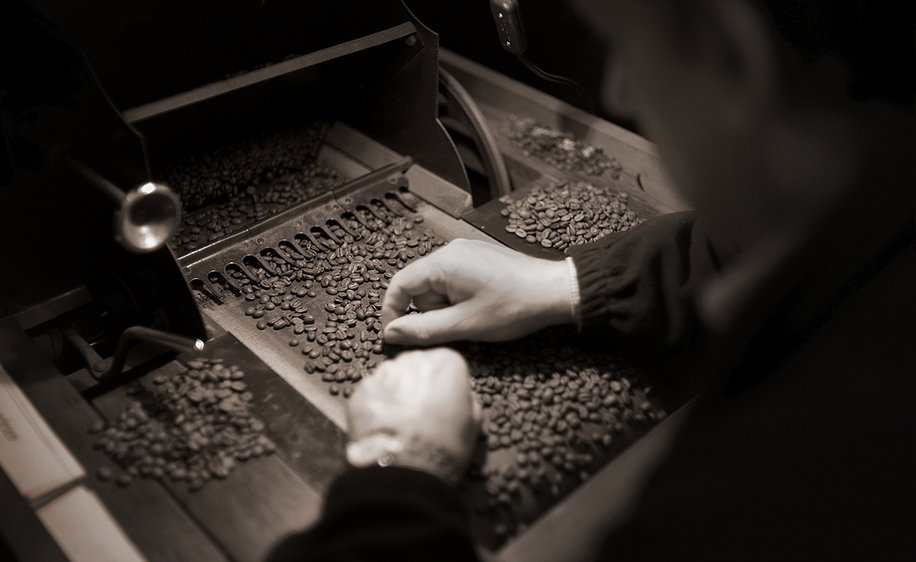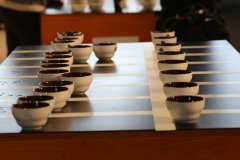Honey-treated beans from the three sisters of Mantenin and lemon tree estates
From Lake Tawa, Aceh Province, North Sumatra, Indonesia, located in the mountains near Takengon village.
The coffee purchased this time is a combination of honey treatment and traditional Indonesian wet planing. First remove the pericarp, dry the moisture content to about 30%, then remove the endocarp, and then dry to complete. Coffee processed in this way exhibits the full body of traditional Indonesian coffee, but also brings rich fruit acids and complex sweetness.
Three Sisters Manor
The current owner of the Three Sisters estate is Don Miguel Gamboya, a fine green coffee grower who owns a small coffee farm and previously sold his coffee cherries to the Volcafe Group for processing in a local processing plant. Two or three years ago, Don Miguel and his family decided that it was time to set up their own processing plant to process the hard-harvested crystals and process and sell the green coffee beans under their own estate name.
Located in the Aserri area of South San Jose, very close to Tara Pearl, the estate is an excellent coffee growing area where coffee cherries ripen very evenly and are almost free of fungal diseases. The estate has just completed the installation and operation of its own micro-processing plant equipment in recent years. The estate is named after its three beautiful daughters, Yenixa,Jocelyn and Yerlin. The entire Gamboya family, father, mother and daughter, are involved in the operation of the estate, from picking, screening to processing. If you have the opportunity to visit this estate, you will be touched by the dedication of a family to a common and simple goal: to improve their lives through dedicated and honest efforts to improve the quality of coffee.
When asked about the goals they expect to achieve by setting up their own microprocessing plant,Yenixa answered modestly, confidently and firmly: "Our microprocessing plant cost about $15,000, which is a huge investment for our family, but we felt that this is what we needed to do to improve the quality of our coffee and have a better future and provide a better education for my two sisters. In addition, we want our coffee to be pure, rather than mixed with hundreds of farmers 'raw beans in Volcafe's processing plant. With our new microprocessing plant, we will be able to provide pure single-source fine coffee green beans from our estate. We know that our coffee is of excellent quality and we want the world to know that."
Lemon Tree Manor
Lemon Tree Estate is located in the Yasica Norte region of Nicaragua and is managed by Santos Demitrio Flores. Coffee cultivation covers an area of 171 hectares, natural reserves of 77 hectares, elevations between 850 and 1,150 meters, and average annual temperatures of 20-28 degrees Celsius.
The estate is mainly planted with Kadura, Java, Pugmala and Yellow Pugmala species. Coffee is picked from December to February, usually by a combination of dry fermentation and washing. This batch of Java species is treated in such a way that it has both floral and fruit acids and is extremely sweet.
The estate belongs to the COE award winning frequent guest, 2007 & 2008 consecutive years won the COE evaluation award in Nigeria.
Florence treatment plant
Florence processing plant is located in Ocotal Nueva Segovia in the north of Nicaragua, where the climate is very suitable for the cultivation and processing of high-quality coffee. Coupled with the high altitude, the quality of coffee processed by this processing plant is unique in Nicaragua. The "Especial" batch is a specialty coffee specially selected from many coffees by the processing plant.
The two Nicaragua coffees we purchased this time are both Javanese. The difference is that the processing methods adopted are different. It is just possible to horizontally compare the coffee of the same tree species in different processing methods. I hope you like it.

Important Notice :
前街咖啡 FrontStreet Coffee has moved to new addredd:
FrontStreet Coffee Address: 315,Donghua East Road,GuangZhou
Tel:020 38364473
- Prev

What is the difference between triangle cup test and coffee cup test?
"What is a cup test?" From a professional point of view, cup test is the process of coffee practitioners grinding, brewing, sipping, tasting and evaluating roasted coffee. Regardless of the subtle differences in various cup test tables, it is generally related to coffee aroma (including dry aroma after grinding, wet aroma after water injection), flavor, aftertaste, acidity, body, consistency, balance and cleanliness.
- Next

Colombian boutique coffee beans introduce Huilan peach and plum valley
Three Colombian micro-batch beans: Cymbidium peach plum valley, Cymbidium Mercedes Manor, Golden Dior Mountains. Ikila City, where Taoli Valley Manor is located, has more than 300 years of history and culture, and the vast and sparsely populated natural environment has created favorable conditions for coffee cultivation. Ikila is located in Huilan province near Cauca province, so it combines a variety of high-quality characteristics of coffee from the two original areas. Which is attached
Related
- Detailed explanation of Jadeite planting Land in Panamanian Jadeite Manor introduction to the grading system of Jadeite competitive bidding, Red bid, Green bid and Rose Summer
- Story of Coffee planting in Brenka region of Costa Rica Stonehenge Manor anaerobic heavy honey treatment of flavor mouth
- What's on the barrel of Blue Mountain Coffee beans?
- Can American coffee also pull flowers? How to use hot American style to pull out a good-looking pattern?
- Can you make a cold extract with coffee beans? What is the right proportion for cold-extracted coffee formula?
- Indonesian PWN Gold Mandrine Coffee Origin Features Flavor How to Chong? Mandolin coffee is American.
- A brief introduction to the flavor characteristics of Brazilian yellow bourbon coffee beans
- What is the effect of different water quality on the flavor of cold-extracted coffee? What kind of water is best for brewing coffee?
- Why do you think of Rose Summer whenever you mention Panamanian coffee?
- Introduction to the characteristics of authentic blue mountain coffee bean producing areas? What is the CIB Coffee Authority in Jamaica?

